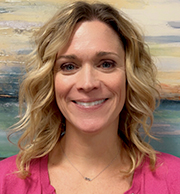
From the Chair: Moving Toward the Policy of Care
By Jennifer Kirk | January 2023
 Over my career I have continued to see fragmentation and disparity in the access to services for my students and all students in Pennsylvania. Where is that policy of care? One year ago, I challenged Pennsylvania School Counselors by asking, “Where is the policy of care?” And now, in 2023, I am asking the same question. Statistics of concern continue to prevail, indicating that we have a mental health state of emergency.
Over my career I have continued to see fragmentation and disparity in the access to services for my students and all students in Pennsylvania. Where is that policy of care? One year ago, I challenged Pennsylvania School Counselors by asking, “Where is the policy of care?” And now, in 2023, I am asking the same question. Statistics of concern continue to prevail, indicating that we have a mental health state of emergency.The National Alliance on Mental Health shares some staggering numbers; one in six U.S. youth aged 6–17 experience a mental health disorder yearly, 50 percent of all lifetime mental illness begins by age 14 and 75 percent by age 24, and suicide is the second leading cause of death among people aged 10–14. The report on disparity in the pandemic informed us that “nearly all students have experienced some challenges to their mental health and well-being during the pandemic and many have lost access to school-based services and supports, with early research showing disparities based on race, ethnicity, LGBTQ identity, and other factors.” These vast deficits continue for our most oppressed and marginalized populations. The gaps in behavioral health services for our highest need students perpetuate with inconsistent and even no access to physicians, psychologists, licensed social workers and psychiatrists, particularly in rural communities across the commonwealth. For school counselors, this becomes our burden to bear and why it is so important to have a withstanding policy of care.
Policies express beliefs, commitments, values, vision and wisdom. They inform practice and are the foundation on which school counselors build systems that may allow for a focus on care. A policy of care must be a priority to allow development of cultures of equitable support across Pennsylvania.
The Pennsylvania School Counselors Association has taken intentional action to move toward the development of a policy of care given that the work of school counselors is at the heart of the school. Moreover, school counselors are advocates for all students and leaders of change. In June 2021, the Framework for Observation & Practice - Non-Teaching Professionals: School Counselor PK-12 was released. This updated school counselor rubric was reimagined, with leadership from PSCA, through the lens of systemic oppression, equity, mental health and wellness, career development, cultural sensitivity and comprehensive school counseling. It provides school counselors clear guidelines to support and care for all students equitably and a resource to communicate district wide the true work of a school counselor. The newly updated PSCA Vision and Mission statements speak to equitable outcomes for all students across the commonwealth.
The Pennsylvania Department of Education (PDE) has taken exciting action to move toward a culture reflective of a policy of care. Final amendments to Chapter 49 (Certification of Professional Personnel) of Title 22 of the Pennsylvania Code became effective in April 2022. These amendments include the Culturally Relevant and Sustaining Education (CR - SE) Program Framework Guidelines. The CR - SE competencies, listed below, are to be integrated into educator preparation, induction and ongoing professional development. School systems across the commonwealth will include CR - SE professional development by the 2023–2024 school year and will be found in preparation and induction programs by the 2024–2025 school year. The nine competencies developed by the PDE are:
- Reflect on One’s Cultural Lens
- Identify, Deepen Understanding of, and Take Steps to Address Bias in the System
- Design and Facilitate Culturally Relevant learning that Brings Real World Experiences into Educational Spaces
- Provide All Learners with Equitable and Differentiated Opportunities to Learn and Succeed
- Promote Asset-Based Perspective about Differences
- Collaborate with Families and Communities through Authentic Engagement Practices
- Communicate in Linguistically and Culturally Responsive Ways that Demonstrate Respect for Learners, Educators, Educational Leaders and Families
- Establish High Expectations for Each Learner and Treat Them as Capable and Deserving of Achieving Success
- Educate Oneself About Microaggressions and their Impact on Diverse Learners, Educators, and Families, and Actively Disrupt the Practice by Naming and Challenging its Use
- Every student can learn, and every student can succeed.
- Every student should have access to and opportunity for a high-quality education.
- Every student should graduate from high school prepared for postsecondary opportunities.
- Every student should have access to a school counseling program.
- Effective school counseling is a collaborative process involving school counselors, students, families, teachers, administrators, other school staff and education stakeholders.
- School counselors are leaders in the school, district, state and nation.
- School counseling programs promote and enhance student academic, career and social/emotional outcomes.
Contact Jennifer Kirk, PSCA board chair, at jkirk@uscsd.k12.pa.us.